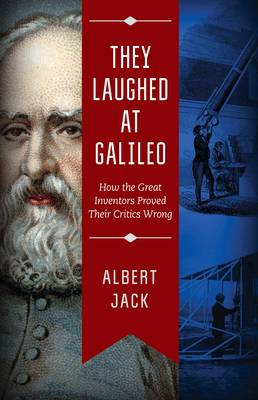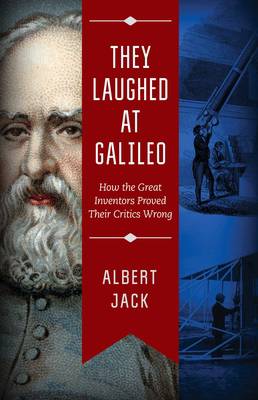
- Retrait gratuit dans votre magasin Club
- 7.000.000 titres dans notre catalogue
- Payer en toute sécurité
- Toujours un magasin près de chez vous
- Retrait gratuit dans votre magasin Club
- 7.000.0000 titres dans notre catalogue
- Payer en toute sécurité
- Toujours un magasin près de chez vous
They Laughed at Galileo
How the Great Inventors Proved Their Critics Wrong
Albert Jack
Livre relié | Anglais
31,95 €
+ 63 points
Description
A humorous account of great inventors and their critics who predicted failure. They Laughed at Galileo takes a humorous and reflective look at one thousand years of the development of humankind: those who dreamt, those who taught, those who opposed, and those who, ultimately, did. At some point in modern history, each and every one of our inventions and discoveries was first envisioned and then developed by a single person, or a handful of people, who dreamt of the seemingly impossible. For them, the future was clear and obvious, but for the vast majority, including the acknowledged experts of their days, such belief was sheer folly. For just about everything that has improved our modern lifestyles in a way that our ancestors could not possibly imagine, there was once a lone dreamer proclaiming, "It can be done." That dreamer was nearly always opposed by a team of "enlightened" contemporaries publicly declaring, "It cannot be done." Well, yes it could. Marconi's wireless radio transmissions were initially deemed pointless. Edward L. Drake's eventual success on August 27, 1859, was called the day "the crazy man first struck oil." Louis Pasteur's theory of germs was considered a "ridiculous fiction." Each of these inventions has had a profound effect on the course of human history, and each one was rejected, resisted, and ridiculed in its day. Ultimately, the innovators who brought these into existence provided invaluable contributions to science and the culture of humankind.
Spécifications
Parties prenantes
- Auteur(s) :
- Editeur:
Contenu
- Nombre de pages :
- 272
- Langue:
- Anglais
Caractéristiques
- EAN:
- 9781629147581
- Date de parution :
- 22-09-15
- Format:
- Livre relié
- Format numérique:
- Genaaid
- Dimensions :
- 124 mm x 201 mm
- Poids :
- 317 g

Les avis
Nous publions uniquement les avis qui respectent les conditions requises. Consultez nos conditions pour les avis.






